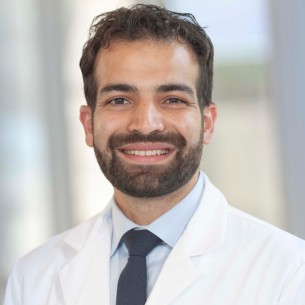 By Ramy Sedhom, MD
By Ramy Sedhom, MD
Burnout—too common among oncologists1 and trainees2—reflects the intensity of our work3 and changes in health care generally. And that was before COVID-19.
Between sickness, fear, moral and political conflict, the past few months have been an all-out crisis. Fellows have handled unexpected changes in education and work, delays in research, and lost opportunities for grant funding. Many continued full-time care and full-time oversight of their kids’ education, without the benefit of their regular support systems. While a pandemic is hardly an ideal circumstance to discuss improving workplace culture, it does offer an opportunity to reflect.
The science around what fuels burnout is not new. We know burnout doesn't originate from a single event, but is instead a reflection of work culture. In medical education, we are not encouraged to be original. As we progress in our post-graduate years of training, creativity is stifled, and we instead take the path most often traveled. Gifted, motivated, and well-connected fellows write promising clinical trials and achieve grants, but rarely deviate from a traditional path. They focus their energy on consuming existing scientific knowledge, conforming to codified rules. We set our goals to achieve certain milestones, and forget an important source of motivation: a sense of service to others and engaging in work meaningful to us.
Creativity is hard to nurture, but easy to thwart. Rarely are oncology fellows encouraged to sort out their own values and discover their own interests. Some of this is due to a lack of time and existing pressures for immediate results. As a result, we have a year to decide on our silo—our disease interest or research focus—and whether we will pursue academia or community practice. And some of this is due to an insular community—how many of us are exposed to mentors outside of our program or academia generally? All of this reminds us that burnout does not start with feeling exhausted, cynical, and ineffective—the triad defined in empirical studies. The beginning looks quite different. It starts with a desire to prove our worth—to show that we belong.4 For many fellows, this means striving to earn the approval of our local mentors and the admiration of our peers. We become entrenched and trapped into expected ways of thinking. How many fellows in your program did you see pursue an unconventional path?
Ask yourself this question: Are you pursuing now what initially motivated you to become a medical oncologist?
Most of us likely decided to pursue a career caring for patients with cancer from a personal encounter or enjoyable experiences in medical school or residency training. We appreciated the relationships that form between doctor, patient, and family. The vulnerability, the complexities of human emotion, and the opportunity to heal physical and spiritual wounds. Yet, by the end of fellowship, our motivations and approach are quite different. Patients are seen as an obstacle to our successful research. We look for jobs with minimal clinical time to avoid the undue burden and to set ourselves up for “success.” Sure, part of this might reflect a better understanding of the tragedy of modern medicine—but I wonder how much of it is pandering to someone else’s definition of achievement.
The current pandemic has changed how I’ve thought about my career. COVID-19 highlighted a pandemic of patient suffering. It verified my prior belief that strong training in palliative care for oncologists cannot be overstated5 and that opportunities to teach palliative care competencies are missed. It also reinforced the limitations of our current training infrastructure, one deeply rooted in tradition, that overvalues personal success (largely defined by publications and success in research) and often devalues exemplary patient care and community advocacy. The pandemic has also accelerated digitization (telemedicine, teleworking, remote learning), yet we have not thought critically about how to best position the future of our trainees, the rising millennials.
It’s both futile and impossible to predict what skills will be needed beyond the immediate future. Two things that seem to matter most, though, remain low on the priority list of medical education:
- Learning agility: The ability to unlearn and learn new things and apply what you know in rapidly changing contexts
- Organizational psychology: Finding meaning in work, leadership, and culture; fostering generosity, innovation, and compassion
These are timeless skills and would likely make us better people and better doctors. Each of us are often unaware of how our training deeply impacts others. Do we really have to go through great adversity in medical school, residency, and fellowship to develop resiliency? Or is this post-traumatic growth? Is deep focus into the HER-2 receptor or the most recent targeted therapy always the best path forward or should we leverage our generational psychology to positively impact the world?6
Most of our health care systems, academic practices, and training programs invest in developing our skills, knowledge, and competence. Very few help build and sustain our capacity—our energy and passions—which are assumed and taken for granted. We are the generation deemed "confident, connected, and open to change."7 We embody the characteristics needed to battle the social determinants of health. Yet, the metrics of success—especially at the trainee and early-career level—are often arbitrary, involve self-promotion, and are devoid of meaning, societal or community advancement. This is in direct contrast with the science of wellness, where people want their work to be meaningful, aligned with their passion, and filled with a sense of purpose.
Regrettably, the high demands and fast pace of clinical care do not leave much time to pay attention to these issues, and many of us do not have a mentor, sponsor, or workplace that emphasizes meaning and purpose as a potential source of energy and metric of success. This past year has been a reminder of the vanity of living just to appease others, and of how important it is to celebrate your individuality.
Stuck at home, away from all of the distractions of everyday life, I recognized my true joy came from two things: my family and the privilege of being both an oncologist and a palliative care physician. Work gave me purpose. For me, meaning comes from building relationships with my patients and attending to their physical, emotional, and spiritual needs—not necessarily writing about them. And with that in mind, I was happy to accept a position as a medical oncologist and palliative care physician at a satellite of an academic center, where I can spend the majority of my time caring for patients and have the opportunity to impact my local community. I’m thankful for mentors who were always supportive and who presented themselves as normal people: fathers, mothers, sons, daughters, and grandparents.
We all need to find ways to bring more joy into fellowship training and our future workplace. Trainees: Start by taking back control of what you read and how you spend your time. Stay committed to your passions and individuality. We are privileged with endless opportunity. We have the highly sought after skills needed to truly change health care. Think more widely, drawing your learning experiences from the rich tapestry of life: movies, conversations with family and patients, museums, advertising campaigns, political speeches, and even tweets. Ironically, many of these things are what will make you a better clinician and researcher. David Epstein makes the argument wonderfully in Range: Why Generalists Triumph in a Specialized World.
Training programs, program directors, and future employers: Let’s become more progressive and authentic in how we define success for our fellows. Be encouraging of those who enjoy patient care. Support those who pursue unconventional paths, who dream big and want to make change. Be a giver.8 Acknowledge and remind us that support networks are critical—and that there is life outside of our office. If there is one thing we all missed this past year, it was the simple joys of friends and family. As we consider new definitions of professional success, let’s remember never to take those relationships for granted.
Dr. Sedhom is a palliative care fellow at Memorial Sloan Kettering, and a recent graduate of the medical oncology program at Johns Hopkins. His research interests are focused on improving the processes of cancer care that contribute to the distress of patients and their caregivers. Follow him on Twitter @ramsedhom. Disclosure.
References
- Allegra CJ, Hall R, Yothers G. Prevalence of burnout in the U.S. oncology community: results of a 2003 survey. J Oncol Pract. 2005;1:140-7.
- Shanafelt TD, Raymond M, Horn L, et al. Oncology fellows’ career plans, expectations, and well-being: do fellows know what they are getting into? J Clin Oncol. 2014;32:2991-7.
- Shanafelt TD, Raymond M, Kosty M, et al. Satisfaction with work-life balance and the career and retirement plans of US oncologists. J Clin Oncol. 2014;32:1127-35.
- Back AL, Steinhauser K, Kamal AH, et al. Why burnout is so hard to fix. JCO Oncol Prac. 2017;13:348-51.
- Sedhom R, Gupta A, Kamal AH. Case for dual training in medical oncology and palliative care. JCO Oncol Pract. 2020;16:537-9.
- Tanenhaus S. Generation nice. New York Times. Aug 15, 2014. Accessed Jan 11, 2021.
- Millennials: Confident. Connected. Open to Change. Pew Research Center. Feb 24, 2010. Accessed Jan 11, 2021.
- Dominus S. Is giving the secret to getting ahead? New York Times. Mar 27, 2013. Accessed Jan 11, 2021.


Recent posts